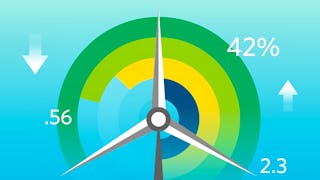Through this ESG Investing: Industry Impacts & Transformations course, students with basic knowledge of traditional financial products can explore how certain financial market sectors have been transforming, amid a heightened focus on risk factors that underpin the three pillars of ESG. For example, what led age-old, iconic companies such as Borden and Dean Foods to file for bankruptcy? How are traditional oil giants BP and Exxon Mobil managing the energy transition? And what steps are firms such as International Paper and WestRock taking to align their business operations with forestry concerns? Through a series of video, webinar, and reading modules, among other objectives, you’ll learn how to conduct critical analyses about certain market sector changes, including dairy, tobacco, energy, and forest products, as well as examine the potential role for certain commodities, as industries such as the auto sector undergo transformation. You should also be able to assess the potential impacts on the creditworthiness of certain high yield companies amid shifts in ESG strategies.

Enjoy unlimited growth with a year of Coursera Plus for $199 (regularly $399). Save now.

ESG Investing: Industry Impacts & Transformations
This course is part of ESG Investing: Financial Decisions in Flux Specialization

Instructor: Steven Levine
3,262 already enrolled
Included with
(25 reviews)
Recommended experience
What you'll learn
Identify certain market sector changes, including dairy, tobacco, energy, and forest products.
Discuss shifts in certain company strategies aligned with ESG-related concerns.
Explore how to assess the potential impacts on the creditworthiness of certain high yield companies amid heightened attention to ESG-related risks.
Explain the potential role for certain commodities, as industries such as the auto sector undergo transformation.
Skills you'll gain
- Environmental Issue
- Corporate Sustainability
- Investment Management
- Governance
- Oil and Gas
- Financial Market
- Emerging Technologies
- Sustainability Standards
- Portfolio Management
- Credit Risk
- Sustainable Business
- Market Trend
- Environmental Social And Corporate Governance (ESG)
- Transportation Operations
- Market Analysis
Details to know

Add to your LinkedIn profile
See how employees at top companies are mastering in-demand skills

Build your subject-matter expertise
- Learn new concepts from industry experts
- Gain a foundational understanding of a subject or tool
- Develop job-relevant skills with hands-on projects
- Earn a shareable career certificate

There are 8 modules in this course
ESG-related issues have impacted different business sectors in more or less dramatic ways, and as governments, companies, and their stakeholders increase their engagement with these concerns, traditional industries seem to be staging significant transformations. In this module, we explore how ESG has influenced material business sector shifts in the areas of forest products, energy, transportation, dairy, and healthcare, among others, to enable you to home in on asking critical questions when performing fundamental analysis.
What's included
2 videos5 readings1 assignment
While the following webinar, “How to Make an Impact Through Credit Investing”, focuses on how heightened attention on ESG risk factors have impacted the businesses of certain high yield companies, Venk Reddy, founder and chief investment officer of Zeo Capital Advisors, also highlights several other related topics – including investment styles, such as ESG integrators and passive screeners, as well as discusses certain areas of concern, including green washing, and regulatory disclosures, which will be echoed in later lessons. Also, through this presentation, you’ll find out, among other objectives, how ESG analysis may be compared to credit analysis, why intentionality is a critical component in performing due diligence and company selection in a sustainable portfolio, as well as ways in which investors may be able to differentiate authentic management from marketing schemes.
What's included
3 videos1 reading1 assignment
The “How to Make an Impact Through Credit Investing” webinar continues with Venk Reddy, founder and CIO at Zeo Capital Advisors, addressing how high yield energy companies are generally managing the transition towards alternative energy, as well as the risk/reward profile of ESG-related vs non-ESG business sectors, and outlines a process for conducting fundamental analysis on an ESG-related, fixed income portfolio.
What's included
3 videos1 assignment
The “How to Make an Impact Through Credit Investing” webinar continues with Venk Reddy, founder and CIO at Zeo Capital Advisors, highlighting the importance of company character, including intentionality, as well as offering ways in which to approach ESG investing if self-managing, or outsourcing the management of, a fixed income portfolio.
What's included
2 videos1 reading1 assignment1 peer review
In this module, we’ll take a deeper look at how the transportation sector is transforming in the wake of ESG-related concerns – and how, as a result, the supply and demand dynamics for certain financial assets, such as commodities, may change. The following webinar, “Batteries: Harnessing the Power of the Energy Transition”, presented by Nitesh Shah, research director at WisdomTree Europe, examines, among other topics, a proposed trajectory for electric vehicle sales, and how advancements in battery technology are opening new markets – from electric vehicles to energy storage systems. Shah also details how he expects electric vehicles to drive lithium-ion battery growth and highlights how certain commodities may benefit from their increased production. He further outlines how certain equities may also benefit across all parts of the value chain.
What's included
3 videos1 reading1 assignment
The “Batteries: Harnessing the Power of the Energy Transition” webinar continues with Nitesh Shah, research director at WisdomTree Europe, providing an outlook on the costs of batteries, as well as a forward-looking comparison of purchasing electric vs internal combustion engine vehicles. Shah also walks through the supply/demand dynamics of renewable energies, as well as the commodities that are used to produce batteries.
What's included
3 videos1 assignment
The “Batteries: Harnessing the Power of the Energy Transition” webinar continues with Nitesh Shah, research director at WisdomTree Europe, breaking down the battery value chain and identifying related investment opportunities in certain commodities and equities.
What's included
3 videos3 readings1 assignment2 peer reviews
This Reading Reinforcement module provides you with more detailed information about specific business sector and individual company shifts in the wake of different sustainability-driven issues. After completion, you should be able to describe how certain of SASB’s industry standards align with the UN’s Sustainable Development Goals, as well as related changes in market sectors and companies’ strategies.
What's included
1 video8 readings1 assignment1 peer review
Earn a career certificate
Add this credential to your LinkedIn profile, resume, or CV. Share it on social media and in your performance review.
Instructor

Offered by
Explore more from Finance
 Status: Free Trial
Status: Free TrialUniversity of Pennsylvania
 Status: Free Trial
Status: Free TrialUniversity of Pennsylvania
 Status: Free Trial
Status: Free TrialInteractive Brokers
 Status: Free Trial
Status: Free TrialCorporate Finance Institute
Why people choose Coursera for their career




Learner reviews
25 reviews
- 5 stars
84%
- 4 stars
8%
- 3 stars
4%
- 2 stars
0%
- 1 star
4%
Showing 3 of 25
Reviewed on Feb 4, 2023
This course is great for budding ESG professionals. Every section in this chapter is explained with an Industry example.

Open new doors with Coursera Plus
Unlimited access to 10,000+ world-class courses, hands-on projects, and job-ready certificate programs - all included in your subscription
Advance your career with an online degree
Earn a degree from world-class universities - 100% online
Join over 3,400 global companies that choose Coursera for Business
Upskill your employees to excel in the digital economy
Frequently asked questions
To access the course materials, assignments and to earn a Certificate, you will need to purchase the Certificate experience when you enroll in a course. You can try a Free Trial instead, or apply for Financial Aid. The course may offer 'Full Course, No Certificate' instead. This option lets you see all course materials, submit required assessments, and get a final grade. This also means that you will not be able to purchase a Certificate experience.
When you enroll in the course, you get access to all of the courses in the Specialization, and you earn a certificate when you complete the work. Your electronic Certificate will be added to your Accomplishments page - from there, you can print your Certificate or add it to your LinkedIn profile.
Yes. In select learning programs, you can apply for financial aid or a scholarship if you can’t afford the enrollment fee. If fin aid or scholarship is available for your learning program selection, you’ll find a link to apply on the description page.
More questions
Financial aid available,
¹ Some assignments in this course are AI-graded. For these assignments, your data will be used in accordance with Coursera's Privacy Notice.

